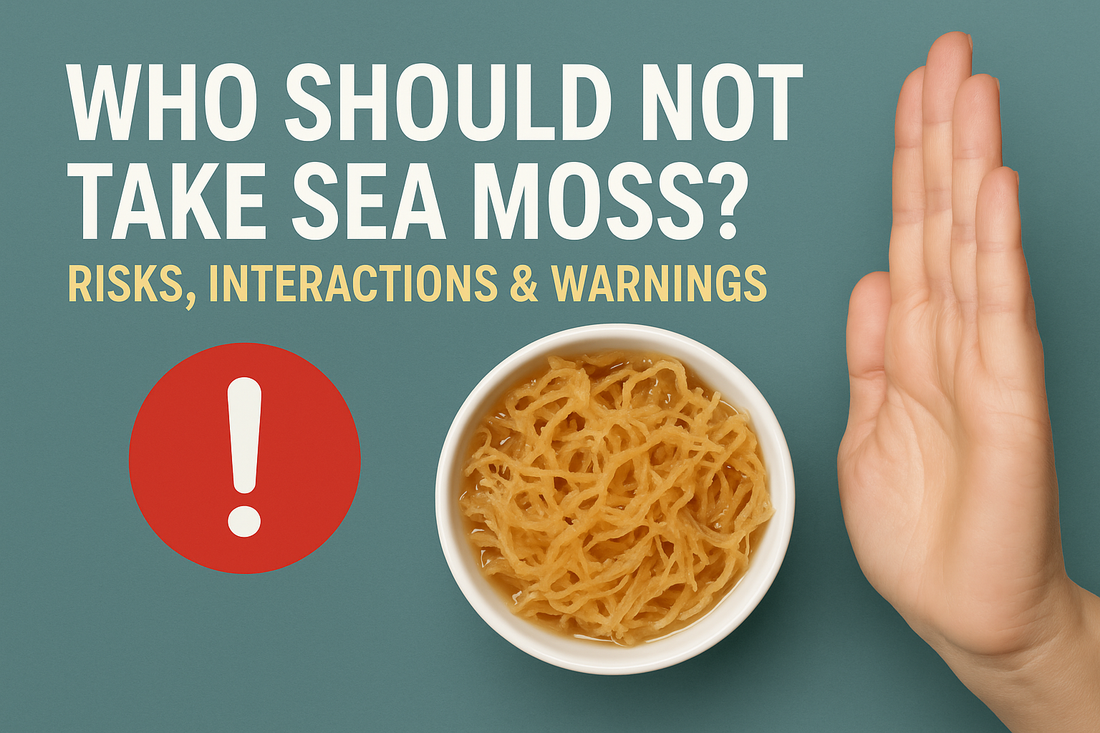Introduction – Why Safety Matters With Sea Moss
Sea moss is trending everywhere, from health stores to TikTok smoothies. While it offers impressive health benefits, it isn’t safe for everyone. Like any supplement, there are certain sea moss risks and potential side effects you need to know before adding it to your daily routine.
In this guide, we’ll break down who should avoid sea moss, how it interacts with medications, and what you need to watch out for.
Groups Who Should Avoid Sea Moss
Although sea moss is natural, it’s not automatically safe for everyone.
People With Thyroid Problems
Since sea moss is rich in iodine, it can overstimulate the thyroid. Those with hyperthyroidism or people already taking thyroid medication should be cautious.
Pregnant or Breastfeeding Women
Sea moss hasn’t been studied enough for safety during pregnancy or breastfeeding. It’s best to avoid it unless recommended by a healthcare professional.
Children Under 12
Because of limited research and higher sensitivity to iodine, children should avoid regular sea moss supplementation.
Medication Interactions
Like other natural supplements, sea moss can interact with certain medications.
Blood Pressure Drugs
Sea moss naturally lowers blood pressure, so combining it with medication could cause it to drop too low.
Diabetes Medications
Because sea moss may lower blood sugar, it can interact with insulin or diabetes pills, leading to dangerously low sugar levels.
Sea Moss and Iodine Overload
Sea moss is packed with iodine, which is great for thyroid health — but too much can be harmful. Iodine overload can cause:
-
Anxiety
-
Heart palpitations
-
Weight loss or gain
-
Hormonal imbalances
People who already eat a high-iodine diet (like lots of seafood or iodized salt) should be extra careful.
Possible Allergic Reactions
Since sea moss is harvested from the ocean, it may cause allergic reactions in those sensitive to seaweed, shellfish, or iodine. Symptoms can include:
-
Itching or rash
-
Swelling of the throat
-
Difficulty breathing (seek immediate medical help)
How Much Is Too Much?
Experts recommend 1–2 tablespoons of sea moss gel daily, or about 500–1000mg in capsule form. Anything beyond that increases the risk of iodine overload and stomach issues.
Safer Alternatives for At-Risk Groups
If you fall into the “avoid” category, don’t worry — there are alternatives.
-
For immune support: Try elderberry or vitamin C
-
For gut health: Probiotics or chia seeds
-
For skin health: Collagen supplements or aloe vera
These provide many of the same benefits without the high iodine risk.
Final Thoughts – Should You Take Sea Moss?
Sea moss can be an amazing supplement — but not for everyone. People with thyroid issues, pregnant women, and those on certain medications should avoid it or consult a doctor first.
For the rest, moderate daily use can provide health benefits without major risks. As with any supplement, balance and awareness are key.
👉 Learn more about possible Sea Moss Side Effects
📖 External Reference: Medical News Today – Sea Moss Benefits & Risks

